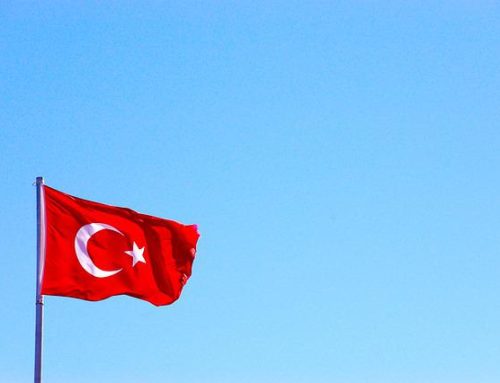11.09.2020
Income and Living Conditions Survey, 2019 in Turkey
The income information regarding the Income and Living Conditions Survey 2019 results refers to the year 2018, the previous calendar year. In the calculation of income, the households income is converted into the equivalent household disposable income by taking into account the size and composition of the household.
According to survey results, the share of the top quintile by the equivalised household disposable income was 46.3% recording a decrease of 1.3 points whilst the share of the bottom quintile was 6.2% with an increase of 0.1 points in comparison with the previous year.
Distribution of annual equivalised household disposable income by ordered quintiles (%), 2010-2019

Gini coefficient was 0.395
Gini coefficient one of the measures of income inequality varies between 0, which reflects complete equality and 1, which indicates complete inequality. According to 2019 results, Gini coefficient was estimated at 0.395 with a decrease of 0.013 points compared with the previous year. S80/S20 ratio calculated as the ratio of total income received by the richest 20% of the population to that received by the poorest 20% of the population decreased from 7.8 to 7.4, while the S90/S10 ratio, which is calculated as the ratio of total income received by the richest 10% of the population to that received by the poorest 10% of the population decreased from 13.7 to 13.0.
Income distribution indicators by equivalised household disposable income, 2010-2019

Mean annual household disposable income was 59 thousand 873 TL
The mean annual household disposable income was 59 thousand 873 TL in 2019 with an increase of 16.5% compared to last year in Turkey.
Mean annual household disposable income and change compared to the previous year, 2010-2019

Mean annual equivalised household disposable income was 28 thousand 522 TL
In Turkey, the mean annual equivalised household disposable income increased by 17.9% compared to the previous year from 24 thousand 199 TL to 28 thousand 522 TL.
Mean annual equivalised household disposable income and change compared to the previous year, 2010-2019

One person households had the highest mean annual equivalised household disposable income
According to the household type, the highest mean annual equivalised household disposable income observed among the one person households with 37 thousand 262 TL with an increase of 4 thousand 616 TL compared to last year. The mean annual equivalised household disposable income of the multi-person no-family households 32 thousand 941 TL while this income of the one-family households was 29 thousand 449 TL. The household type with the lowest mean annual equivalised disposable income was extended-family households with 22 thousand 794 TL.
Mean annual equivalised household disposable income by household type (TL), 2018, 2019

Wages and salaries held the highest proportion of total income with 46.7%
The ratio of wage and salaries got the highest rate with 46.7% of total equivalised household disposable income with a decrease of 1.8 points compared with the previous year. This was followed by social transfers 21.9% with an increase 1.8 points and the entrepreneurial incomes 17.7% with a decrease of 1.1 points compared to 2018.
The share of agricultural income in the entrepreneurial income was realized as 22.6% by decreasing 0.3 points compared to 2018. Pensions and survivor’ benefits composed 91.8% of social transfers with an increase of 0.8 points compared to previous year.
Distribution of annual income by types of income (%), 2018, 2019 Percentage point changes
according to types of income, 2018, 2019

Higher education graduates had the highest mean annual income at main job with 51 thousand 888 TL
Mean annual income at main job was calculated as 51 thousand 888 TL for higher education graduates, 34 thousand 115 TL for high or equivalent school graduates, 26 thousand 833 TL for those with less than high school education 18 thousand 279 TL for those who do not graduate from a school and 14 thousand 129 TL for illiterate individuals. In 2019, compared to 2018, the highest increase in income at main job was observed in the illiterate individuals with 17.3% and the lowest increase was in literate individuals with no degree with 8.6%.
Mean annual income at main job by education status (TL), 2018, 2019

Construction sector held the highest increase of total income with 18.9%
When the mean annual income at main job are analyzed in branch of economic activity; it was observed that the highest mean annual income was in the service sector with 37 thousand 169 TL and the lowest mean annual income was in the agriculture sector with 21 thousand 807 TL. Compared to the previous year; the highest increase in mean annual income was observed in the construction sector with 18.9%, followed by the agricultural sector with 14.8%. On the other hand, an increase of 12.5% was observed in the service sector and 12.0% in the industrial sector.
Mean annual income at main job by branch Percentage change of mean annual income at
of economic activity (TL), 2018, 2019 main job by branch of economic activity (%), 2018, 2019

Employers had the highest mean annual income at main job with 95 thousand 495 TL
Mean annual income at main job was 95 thousand 495 TL for employers, 34 thousand 286 TL for regular employees, 27 thousand 127 TL for self employed workers and 14 thousand 769 TL for casual employees. Compared to the previous year, the highest increase was in regular employees with 13.9% and the lowest increase was in self employed workers with 8.2%.
Mean annual income at main job by employment status (TL), 2018, 2019

Relative poverty rate was 14.4%
The people having incomes below a specified line compared to the general population is defined to be the poor in a relative meaning. The at-risk-of-poverty-rate according to poverty threshold set at 50% of median equivalised household disposable income was 14.4% with an increase of 0.5 points compared to 2018. As for the at-risk-of-poverty-rate according to poverty threshold set at 60% of median equivalised household disposable income, it was 21.3% with an increase of 0.1 points in comparison with the previous year.
Poverty rate by equivalised household disposable income (%), 2010-2019

The at-risk-of-poverty-rate according to the poverty threshold set at 40% of median equivalised household disposable income was 8.3% with an increase of 0.4 points compared to the previous year and poverty threshold set at 70% of median equivalised household disposable income was 28.5% without a change.
One person households and multi-person no-family households had the lowest poverty rate
Considering poverty rates according to poverty threshold set at 50% of median equivalised household disposable income in terms of household types, at-risk-of-poverty-rate of one person households was 9.2% with a decrease of 0.4 points, multi-person no-family households was 9.2% with an increase of 1.5 points, extended family households was 18.2% with a decrease of 0.6 points and one-family households was 13.8% with an increase of 0.9 points compared to the previous year.
Poverty rate by 50% of median equivalised household Poverty rate by 60% of median equivalised household
income and household type (%), 2018, 2019 income and household type (%), 2018, 2019

26.1% of illiterates and 2.5% of higher education graduates were poor
In terms of the at-risk-of-poverty-rate according to poverty threshold set at 50% of median equivalised household disposable income, 26.1% of illiterates and 22.4% of literates with no degree were poor. The figures for less than high school and high school graduates were 13.4% and 6.9% respectively. Higher education graduates were the group with the lowest poverty rate with 2.5%.
Poverty rate by education status (%), 2018, 2019

Severe material deprivation rate was 26.3%
Material deprivation reflects to perception of households about inability to pay unexpected financial expenses, one week’s annual holiday away from home, mortgage or rent payments, a meal with meat, chicken, fish every second day and heating home adequately warm and the ownership of a washing machine, a color TV, a telephone and a car.
The severe material deprivation rate defined as the rate of people faced with the enforced inability to afford at least four of the above-mentioned items decreased from 26.5% in 2018 to 26.3% in 2019.
Material deprivation rate and percentage point change compared to the previous year, 2010-2019

Persistent at-risk-of-poverty-rate was 12.7%
The persistent at-risk-of-poverty rate shows the percentage of the population living in households where the equivalised disposable income was below the at-risk-of-poverty threshold set at 60% of median equivalised household income for the current year and for at least two out of the preceding three years. In 2019 the persistent at-risk-of-poverty-rate was 12.7% the same as the previous year.
Persistent at-risk-of-poverty-rate by 60% of median equivalised household income and percentage point change compared to the previous year, 2010-2019

The share of people living in their own dwellings was 58.8%
In 2019, the proportion of the population living in their own dwellings decreased by 0.2 point compared to the previous year, it was calculated as 58.8% while the share of those living in rented house was 25.6%, the share of those living in lodging was 1.3% and the share of those who did not pay rent despite not living in their own dwellings was 14.3%.
Tenure status (%) 2018, 2019 Percentage point changes of
tenure status 2018, 2019

Inability of heating due to isolation was the most common housing and environmental problem
According to the 2019 results 39.3% of the non-institutional population had heating problem due to isolation. This ratio was calculated 36.9% for population faced with problems in their dwellings such as leaking roof, damp walls/floors/foundation, rot in window frames/floors and 26.1% for population had pollution, grime due to traffic/industry or other environmental problems.
Housing and environmental problems, (%), 2018, 2019

The percentage of people having installments or loans was 71.1%
71.1% of the population had installments or loans (other than mortgage -for the main dwelling- and housing cost), 0,7 points higher than last year. While these payments did not burden at all to 9.6% of the population, it was a heavy burden to 19.0%. 58.7% of the households reported that they cannot afford paying for one week annual holiday away from home, 33.6% of them cannot afford a meal with meat, chicken or fish every second day, 29.7% of them cannot afford unexpected financial expenses, 19.2% of them cannot afford keeping home adequately warm and 56.6% of them cannot afford replacing worn furniture.
Specified living conditions indicators, 2008, 2019

The next release on this subject will be in September, 2021.
Source: TurkStat
Legal Notice: The information in this article is intended for information purposes only. It is not intended for professional information purposes specific to a person or an institution. Every institution has different requirements because of its own circumstances even though they bear a resemblance to each other. Consequently, it is your interest to consult on an expert before taking a decision based on information stated in this article and putting into practice. Neither Karen Audit nor related person or institutions are not responsible for any damages or losses that might occur in consequence of the use of the information in this article by private or formal, real or legal person and institutions.






